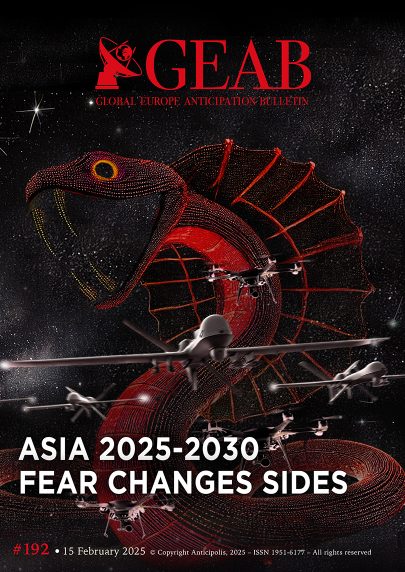GEAB 192
The BRICS’ difficulties in building a suitably influential financial system can be explained by their internal divisions. In 2026, we expect Asia to take over and lay the foundations for a new regional financial order. In the face of Western control and extraterritorial sanctions, the major Asian powers will create independent infrastructures of international importance.
A dominance that’s hard to challenge
For over a decade now, the BRICS alliance has been striving to build an alternative to the world order that is still largely dominated by the West. On the financial and economic fronts, however, the West remains dominant thanks to strong, much-demanded currencies (the dollar retains its hegemony, and the euro is still in second place), as well as ultra-efficient and sophisticated financial systems (in particular the SWIFT system). They use this advantage, particularly the United States, to exert coercive force, mainly through international sanctions (Iran in 2014, Russia in 2022, etc.). However, the weakness of the BRICS is not only linked to the strength of the West, which is steadily weakening under the weight of increasing debt, growing political instability and persistent social tensions. It is also due to the divergences between the countries of the so-called “South”, whether cultural, political or economic, as well as their close links with certain Western powers (particularly Brazil and India).
Login

While Europeans have their eyes firmly fixed on the headlights of the Trump-Musk duo, China, Vietnam, South Korea, Singapore, Indonesia and Malaysia have just celebrated the start of the Year [...]
The transformation of the global landscape is no longer simply a matter of Chinese technological or economic dominance. We are witnessing the emergence of a new world order structured by [...]
The fundamental principles of the Internet in 1995 included free access and technological democratisation. For the most part, the information highways launched at the time seemed to be offered to [...]
Until now, it has been a question of preventing China from overtaking the United States in terms of technology. In 2025, not only will the West realise that China has [...]
At the start of this issue, we put forward the following hypothesis: Asia may be developing at breakneck speed, but it is ultimately following the same economic model of the [...]
2025: Western Sahara, the new investment hotspot! We believe that the Morocco-Algerian disagreement over the Western Sahara will come to an end by 2025. Progress has been slow but steady. [...]

Comments